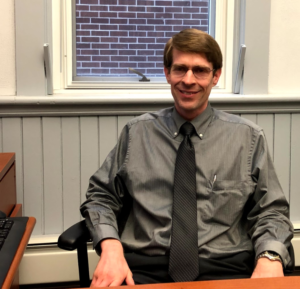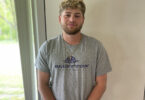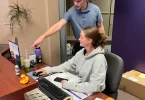This academic school year, Bluffton University is trying to move from focusing on student retention to focusing on student success. The Student Success Plan attempts to draw together areas related to retention and student success, as well as add in some new efforts help students succeed at Bluffton.
“We’re thinking about how we help every student be successful here at Bluffton,” said Lamar Nisly, vice president and dean of academic affairs. “That’s reflective of how we’ve done things here, we just haven’t necessarily used that language. It’s attempting to create the structures and the support network that works to make sure students can be successful before there starts being any sort of challenges.”
The Student Success Plan focuses on ensuring students can be successful at Bluffton so they are able to obtain a degree at the end of their time here. According to Nisly, this is important for several different reasons.

Lamar Nisly, vice president and dean of academic affairs. Photo was taken by Aubrey Bartel
“We believe very deeply in the transformative quality of a Bluffton education and so we know if students stay for four years and graduate, they can go on to do great things,” Nisly said. “Additionally, students who drop out of college have a much higher default rate on their loans than students who complete their degree. It’s both the qualitative elements of living our best lives as well as the practical things of dollars and cents for the students.”
Many aspects of the Student Success Plan are areas Bluffton is already utilizing to help students excel, including Project H.O.M.E., the Discovery Program and the Center for Career and Vocation.
According to Nisly, the most obvious addition comes through the Becoming a Scholar class, where instructors are asked to serve as success coaches for each incoming student. Welcome Weekend was restructured to create an immediate sense of community between individual classes, with the instructors and student mentors meeting with the first-years as early as move-in day.
“We believe that education happens best in relationship, and a lot of research shows that as well,” Nisly said. “If you make a strong bond with a faculty member, you’re likely to persist and succeed in college. This is developing a structure to make sure every student has the opportunity to make those connections.”
Junior Caroline Schutz, a resident advisor and Becoming a Scholar mentor, believes these changes have already been beneficial.
“I thought the way Welcome Weekend was set up this year helped everyone in my class get to know each other better,” Schutz said. “I feel like the discussions have gotten a lot deeper more quickly and our class as a whole has been more comfortable together because we spent all of Welcome Weekend together.”
Other changes include moving up the reporting midterm grades to the five-week point of the semester and a pilot program with 20 football players to help reflect what it means to be both a student and an athlete. Additionally, on Oct. 15, any student who has a hold on their account can go to the technology center from 1 to 4 p.m. and a representative from each department will be there to get the hold resolved so students are able to register for classes.
“It’s a combination of saying, ‘Let’s take a broad approach here so that all students feel that kind of support and then let’s also target particular groups of students who might value or find some need for additional kinds of specific support,’ ” Nisly said. “We’re looking at the populations that experience certain kinds of stressors, certain ways in which it’s a bigger step to go from high school to college and providing support in those ways while giving it breadth by having these success coaches that reach every student.”
Nisly recognizes while it is still too early to be certain if the Student Success Plan is working, there are early signs that point to a positive impact.
“We are really excited that form the start of classes to census day, we did not lose a single student,” Nisly said. “I’m also hearing from instructors in Becoming a Scholar who’ve taught this in the past that they have a sense of cohesion in the class, a sense of students that they’ve connected with, in ways they haven’t done in previous years. Those are really good early signs, that’s what we want.”






